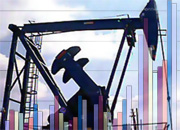Commenting on the results, Mikhail Fridman, interim Chief Executive Officer of TNK-BP, said:
“During the first six months of 2010, TNK-BP continued the track record of strong operating and financial performance. This is the 11thsuccessive quarter of production growth, supported by continued development of new projects in West and East Siberia, as well as sustained focus on optimizing our brownfield operations. We continued upgrading our refineries and expanding our retail footprint in key growth markets in Russia and Ukraine. Of specific note is the progress made towards unlocking the full potential of Rospan, and laying groundwork for executing a new generation of major projects in Yamal. Finally, our financial performance remains strong despite a challenging cost environment, particularly relating to growing transportation and energy tariffs. This set of results once again confirms the company’s growth potential going forward, and we will continue to build up our organizational capacity required to deliver new major projects that will underpin this growth”.
Oil and gas production in 1H 2010 increased by 4.5% to 1.743 million boed compared to 1H 2009 (excluding Slavneft). Production in 2Q increased by 0.7% on the previous quarter, marking 11 consecutive quarters of production growth.
Production growth was driven by greenfield projects, with both Uvat and Verkhnechonskoye delivering improved performance, as well as the mature Orenburg fields with a 9.9% production growth on 1H 2009.
Exploration success was again good, with new discoveries in Yamal and Orenburg adding more than 200 million bbl of new resources. In total 13 new exploration wells were drilled with a 69% success rate.
Rospan production in 1H 2010 increased to 1.5 bcm, up 25% on 1H 2009.
The offer by Gazpromof long-term pipeline access for Rospan production, gradually increasing to 13.2 bcma in 2016, will enable the company to proceed with planning and engineering design of full field development of Rospan.
Associated petroleum gas utilization increased to 86.1%, compared to 84.5% in 1H 2009.
In Downstream, refining margins were strong at $11.8/bbl, compared to $5.91/bbl in 1H 2009. Operational availability of TNK-BP’s refineries continued to improve, reaching 97% during the first half of 2010. This was achieved along with a successful completion of the Ryazan refinery turnaround.
TNK-BP continued to increase the share of its products sold on the St. Petersburg exchange.
The new branded fuel, TNK-Pulsar, was launched in Southern and Central Russia, including Rostov, Krasnodar and Tula.
In 2Q, the weak safety record of the first quarter was reversed, with zero fatalities, zero major vehicle accidents, and the lowest level of injuries recorded since the start of operations.
Jonathan Muir, TNK-BP’s Chief Financial Officer, said:
“This is another solid set of results driven by the outstanding performance of our business segments and prudent financial policies. In the first half of 2010, our net income increased by 21% year-on-year to $2.4bn. We operated in a strong trading environment with a 50% increase in the Urals price over the same period in 2009 which was partially offset by steep increases in export duties and other taxes. Our revenues grew by over 43% to $20.7bn and EBITDA by 22% to $4.7bn. We benefited from continued growth of our greenfield production and steady delivery from our brownfield base despite the pressure on costs from forex changes, tariff increases and inflation. Our financial discipline remained strong with successful debt portfolio management which resulted in maintaining a prudent gearing ratio of 26%”.
Revenues for 1H2010 increased by 43% relative to 1H 2009 due to stronger market conditions.
Export duties and other taxes increased by 82% for 1H 2010 relative to 1H 2009 largely due to the effect of the Urals price increase on export duty and mineral extraction tax rates partly offset by lower export sales volumes.
Cash costs (operating expenses, transportation and SG&A) increased by 18% reflecting the effect of a stronger ruble exacerbated by increased transportation and electricity tariffs.
EBITDA for 1H 2010 amounted to $4.7bn which is 22% higher compared to the same period in 2009 largely due to the combined effect of revenue, tax and cost increases as well as the one-off gain from a cash receipt related to an old customs duty case.
Income Tax in 1H2010 is 24% higher relative to 1H 2009 due to the increased pre-tax profits as well as a one-off reduction of tax audit provision in 1H 2009.
Net Income for 1H 2010 amounted to $2.4bn which is 21% higher compared to the same period in 2009 due to the increase in EBITDA partly offset by increases to tax and legal provisions.
Cash from operations in 1H2010 totaled $3.9bn representing an increase of 37% compared to 1H 2009.
Net debt remained flat along with gearing at 26%.
Organic capital investment amounted to $1.6bn, aimed at focused development of both greenfields and brownfields together with targeted retail and refining spend.
07 Февраля 2026 | суббота | 11:52


